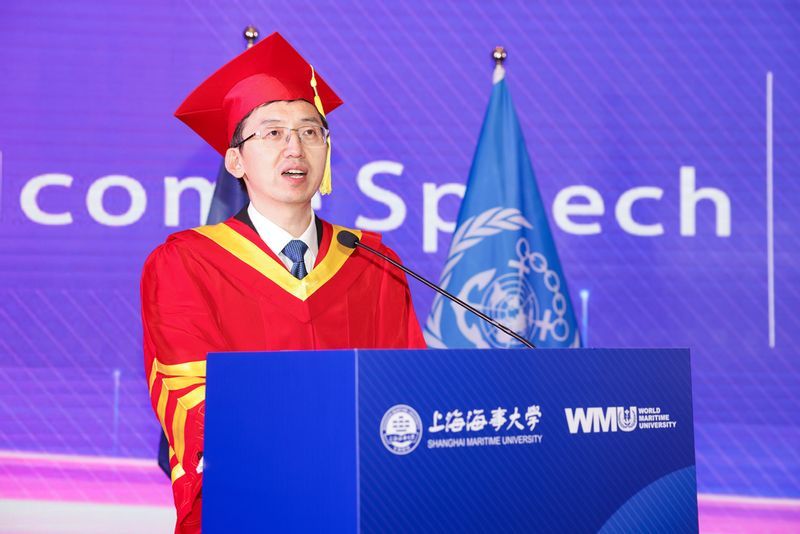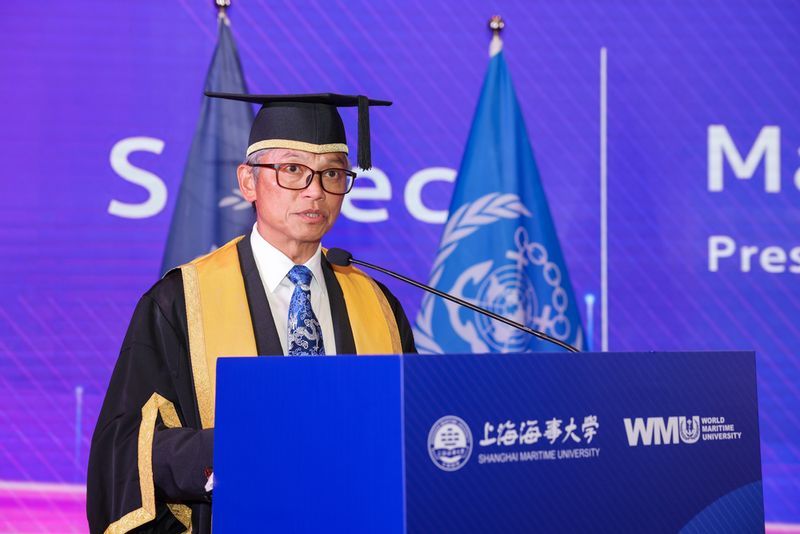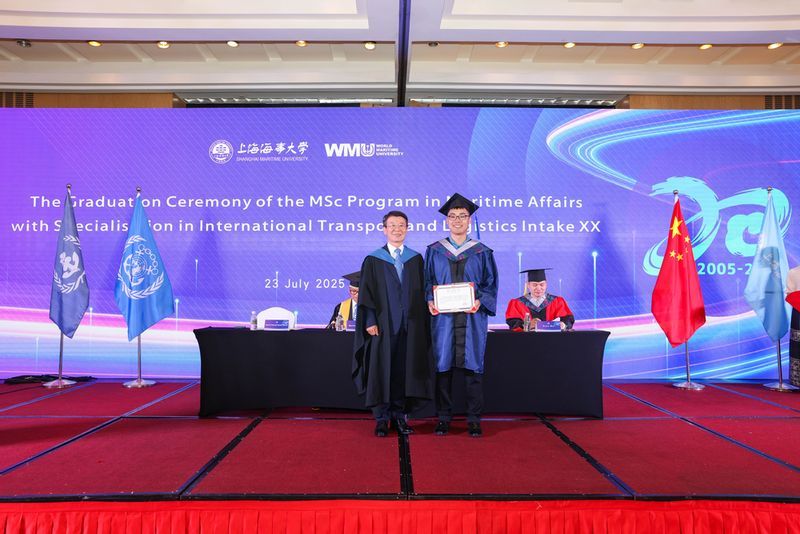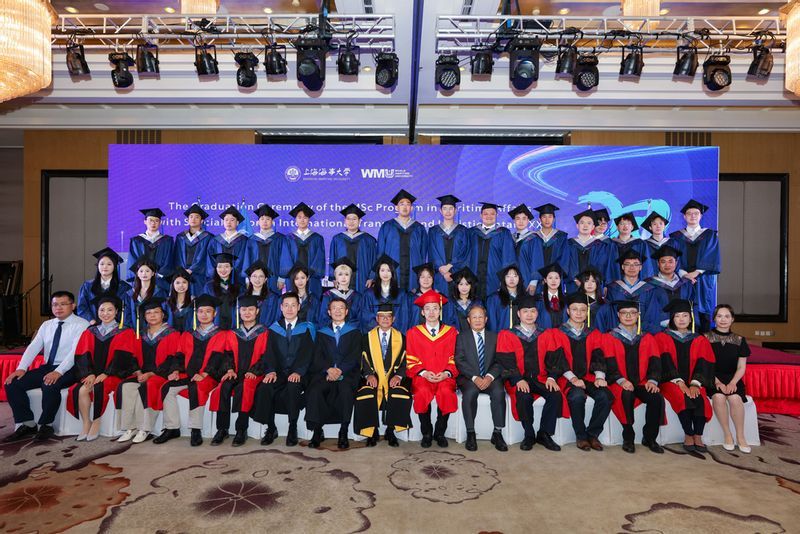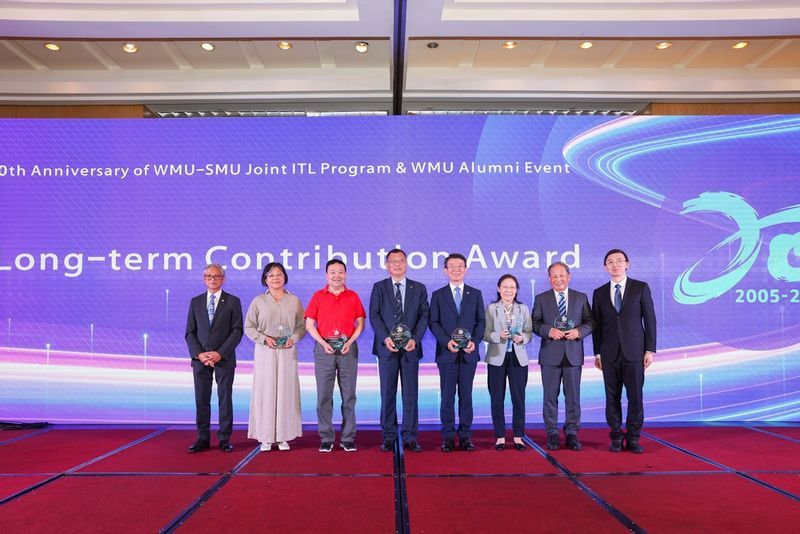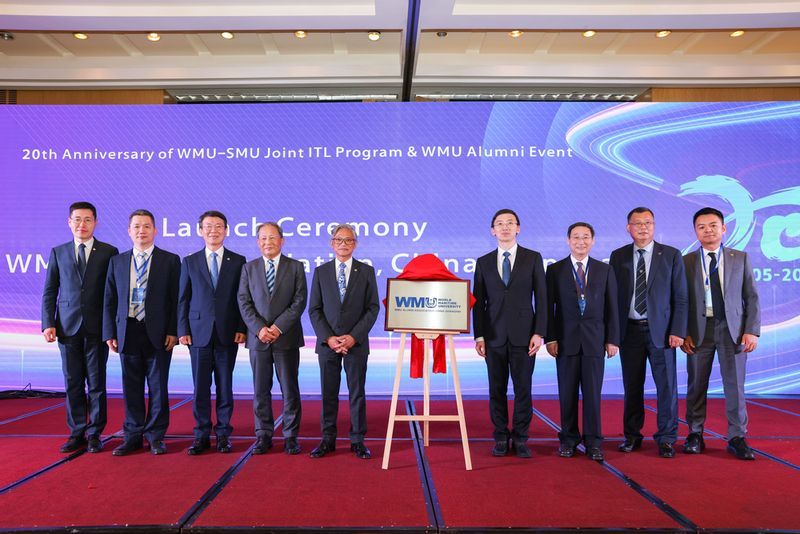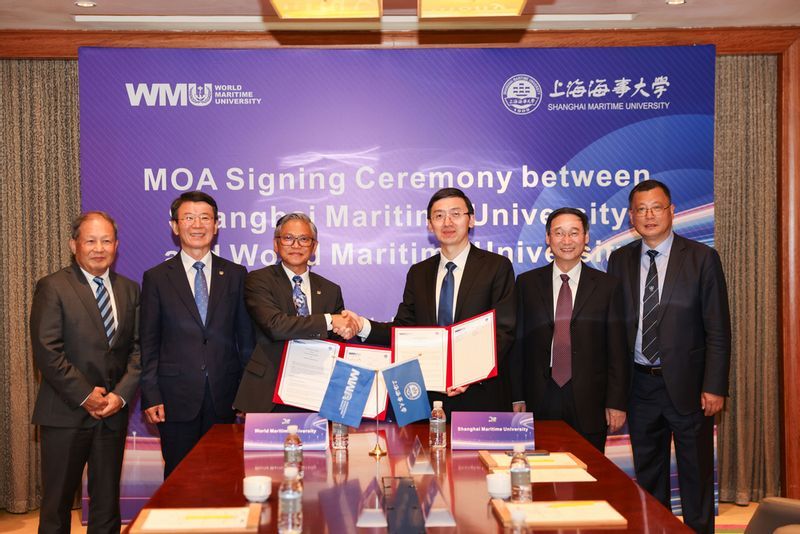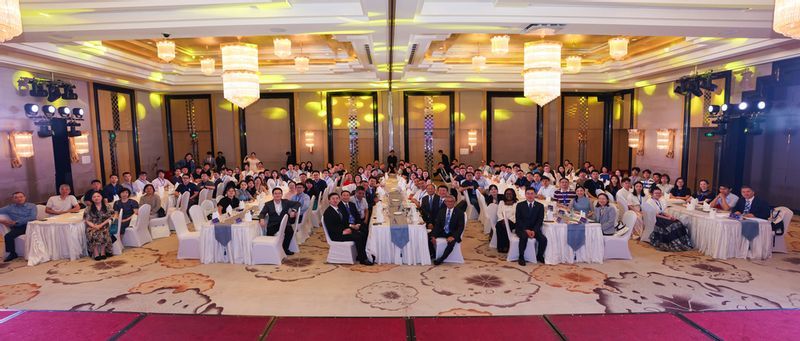On July 23, 2025, Shanghai Maritime University (SMU) and the World Maritime University (WMU) held the 20th Graduation Ceremony and 20th Anniversary Celebration of the Joint MSc in Maritime Affairs, specializing in International Transport & Logistics (Class of 2025), also known as the WMU–SMU Joint ITL Program, in Shanghai.
The ceremony was attended by a delegation from WMU, including President Maximo Q. Mejia, Jr., Vice President Daniel Seong-Hyeok Moon, Program Director Professor Chen Gang, Alumni Assistant Charlotte Wara, and other key representatives.
During their visit to Shanghai, Mr. Song Baoru, Chairman of the SMU Council, met with the WMU delegation. SMU Vice President Yin Ming attended the ceremony on behalf of President Chu Beiping. The event was hosted by the head of the International Office and the International Education College.
Yin Ming extended his heartfelt congratulations to the 33 graduates who received their WMU master’s degrees this year. He expressed his hope that they would continue to learn, remain competitive, embrace innovation, and adapt to the smart, safe, and green development trends in the shipping industry, contributing to its sustainable growth.
He emphasized that the SMU–WMU Joint Program serves as a key pillar of SMU’s international cooperation strategy. Through this collaboration, high-caliber international shipping professionals are cultivated, enriching SMU’s educational portfolio to support the development of China’s maritime sector and Shanghai’s role as an international shipping hub, while further strengthening the university’s ties with the International Maritime Organization (IMO) and the global maritime community.
SMU will continue to leverage its educational strengths, promote innovation, and deepen its strategic partnership with WMU.
In his speech, President Maximo Q. Mejia, Jr. expressed his gratitude for SMU’s steadfast commitment to the joint program and the long-term dedication of its faculty and staff, which have ensured the program’s continued progress and academic quality. He noted that the collaboration between the two universities holds great significance, reflecting their shared commitment to the sustainable development of maritime logistics.
Over the past 20 years, the WMU–SMU Joint ITL Program has become a flagship initiative in international maritime education, upholding academic excellence and cultivating a large number of professionals who have made significant contributions to the global maritime sector.
Founded in 1983 by the International Maritime Organization (IMO), the World Maritime University (WMU) is a research-oriented institution dedicated to training senior management professionals for national maritime administrations, shipping companies, port and shipping enterprises, and maritime academies. It plays a crucial role in global maritime and ocean education, research, capacity-building, and sustainable development.
The WMU–SMU Joint ITL Program is one of WMU’s two international programs. It integrates the educational strengths of both universities, providing students with a comprehensive learning experience that blends international perspectives with local practices.
The program also provides a strong professional alumni network and fosters a deep understanding of the competencies and responsibilities required of future leaders in the maritime and logistics fields.
During the subsequent 20th Anniversary Celebration and WMU Alumni Event in Shanghai, Vice President Yin Ming expressed his gratitude for two decades of cooperation with WMU and for the joint efforts in advancing high-quality maritime education. He acknowledged the professional expertise, dedication, and outstanding teaching and administrative contributions of faculty and staff from both universities to the successful operation of the WMU–SMU Joint ITL Program.
Special recognition was given to Professor Ma Shuo and Professor Gao Deyi for their exceptional contributions to the program’s establishment. Vice President Yin also congratulated the founding of the WMU Alumni Association, China–Shanghai, and expressed his hope that, with the continued support of WMU alumni, collaboration between the two universities will achieve even greater success in maritime education and research.
In his speech, President Maximo Q. Mejia, Jr. pointed out that the founding of the program 20 years ago demonstrated the foresight of both universities in maritime education. As the shipping industry continues to undergo rapid transformation, future goals include achieving zero-carbon shipping, effectively preventing pollution, building resilient supply chains, and ensuring sustainable ocean governance.
These ambitious objectives cannot be achieved by institutions or systems alone but rely on the dedication of industry practitioners. With more than 6,000 alumni from over 170 countries and regions, WMU has built a global network committed to safe, reliable, and sustainable maritime transport. President Mejia warmly welcomed Shanghai’s alumni to join this network, carry forward the maritime spirit shared by the two universities, and contribute their talents and leadership to the development of global shipping.
During the 20th Anniversary Celebration, Long-Service and Contribution Awards were presented to Ma Shuo, Daniel Seong-Hyeok Moon, Xu Dazhen, Wang Xuefeng, Gu Weihong, Yu Hongrong, and other faculty members from both universities.
On July 23, the two universities also signed a memorandum of cooperation, further deepening their collaboration in international education.
The year 2025 marks the 20th anniversary of the WMU–SMU Joint ITL Program, a milestone in the long-standing partnership between SMU and WMU. Over the past two decades, the program has produced 613 graduates from 17 countries and regions, including more than 40 international students from nations such as the Netherlands, Australia, South Korea, Ghana, and Trinidad and Tobago. Graduates are widely employed in leading port and logistics enterprises both in China and abroad, with many holding senior positions in shipping companies, port authorities, and academia—demonstrating the program’s lasting value and global influence.
Over the past 20 years, the two universities have also expanded their cooperation in global maritime capacity-building initiatives, participation in IMO activities, and high-level international maritime conferences. Notably, they co-hosted the Train-the-Trainer Program with MTCC-Asia, supported by the IMO, on April 14, 2025.
